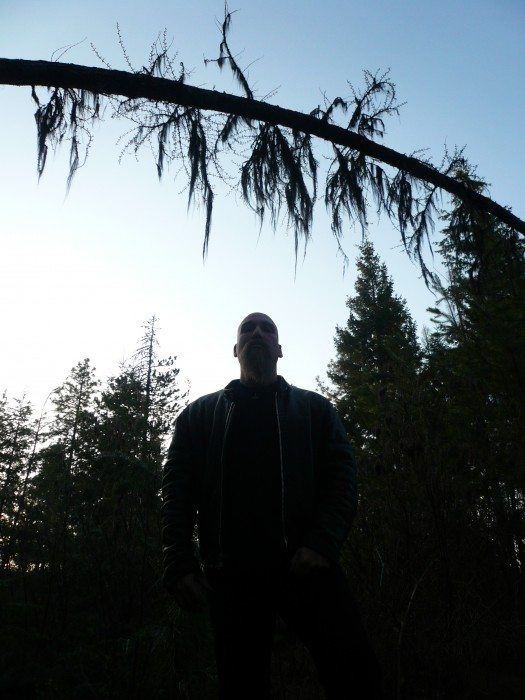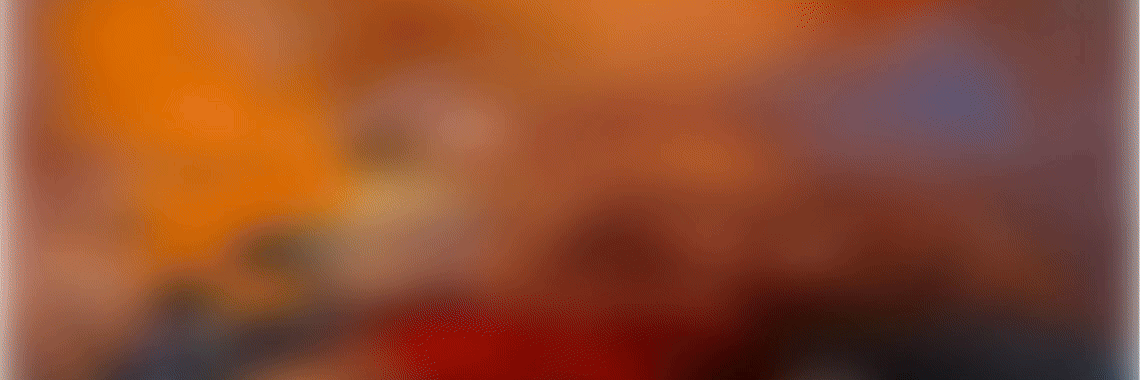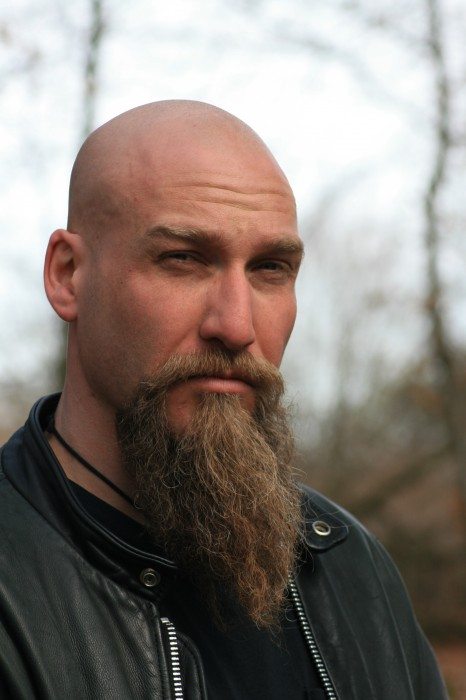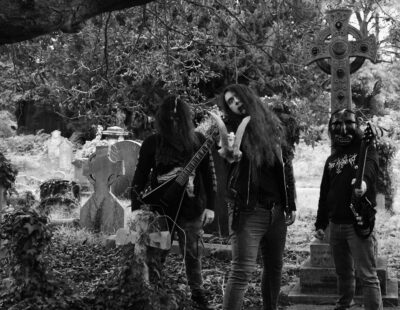
The man-boys in Converge suggest we shouldn’t have any heroes. Ironic, that, since they qualify as heroes themselves. Another hero whose deeds we love to celebrate is Neurosis vocalist/guitarist Steve Von Till. The man has helped guide the forces of nature his band channels into masterpieces of world-ending ferocity, and this alone makes him an astonishing example for musicians and artists of all strains. But the recordings that have endeared him to yours truly fall under his name alone.
The first time I heard As the Crow Flies, Mr. Von Till’s debut solo album, I didn’t know what to make of it. Not because it was quiet and unterrifying; I listen to a lot of simple, melodic music, so I had no high metal horse to come down from. The dream-state undulations, the nocturnal, misty quality of each song left me without specific moments to grasp and anchor myself. It took a few more listens before the record became one of my favorite listening experiences that I have gone back to frequently over the last decade. Subsequent solo albums If I Should Fall to the Field and A Grave is a Grim Horse have had different but no less addictive impact.
Now, Neurot Recordings is re-releasing that first solo record, and we at Decibel are bringing it to you in full right here on the Deciblog. We got a chance to speak to Steve about his recollections involving the songs’ creation, which you can also read below the album stream. [Note: Steve’s comments appear basically as they were spoken, while the writer’s questions were cleaned up significantly to sound less like he was a drooling sycophant.]
First, what do you recall about the way As the Crow Flies came together? How were you feeling about that material at the time?
In some ways I think I fell into making a solo record by default or happenstance rather than design. I had no idea I was recording one until I had a majority of the material. I had been collecting home recording gear for several years before that and was living in an apartment on the ground floor of a 1900 Victorian in San Francisco. It was a noisy place to live, so I would wait until my housemates were asleep and the streets were quiet, and with a half-inch 8-track tape machine and couple shitty microphones I just started putting down these ideas. I didn’t know what they were. Some of them sat for a couple years, some of them sat for only a few months before I realized, if I look back at all these reels of tape that aren’t ideas I was hashing out for Neurosis or Tribes of Neurot, I’ve got this strange grouping of songs that seem to fit together. [They’re] more melancholy, acoustic, quiet recordings; “while the rest of the world is sleeping” kind of material. Once I realized that it was a collection, then I had to decide, “I guess I’m going to release this under my own name.” It’s something I never thought I would do. It didn’t seem important. But I think the music ended up demanding it. With the help of a couple friends I threw together some mixes and finished some pieces up… I can’t recall exactly, I probably wrote an additional piece or two once I realized I was actually writing a record.
When I put it out there, it was actually quite terrifying in some ways because it was unlike Neurosis, where I have a bunch of brothers by my side and we all have each other’s backs and make a shitload of noise and cover up all the insecurity of being exposed out there on a limb. It was the beginning of something which I realized was a life-long quest, to also be able to craft emotionally powerful songs, that are not part of the epic bombast of Neurosis but actually concise tight pieces that still evoke strong emotion and put the listener in a place. I guess, primarily, it’s something that I needed to express, something that was calling out for release.
So you knew when you were writing the songs that they weren’t ideas for Neurosis or for Tribes of Neurot, but it didn’t occur to you that it would become a solo thing?
Not at all, not back then.

In the Decibel cover article on Neurosis [Dec. 2012, #98], you characterized your old Neurosis material by saying: “Proud of what it was, but glad we’re past that.” Do you feel the same way about your solo music, or does it have a different quality for you?
I try to always look forward. I always hope and believe and trust that my best work is still ahead of me. I can always hear the growing pains through each stage, whenever I look back. I hear decisions I would never make now. Not to say I’m not proud of it. I’m totally proud of it, and I think the music, of all the things I’ve been blessed to be part of, continues to stand on its own and has its place in the world. But I don’t think I had found my voice or craft quite at that point, at least not as much as I think it evolved in the following couple solo releases. [On those records] I had a chance to work more by design rather than accident. After the first one then it was like, alright, I have a solo project now.
So with the later solo recordings, did you feel that you were able to work with more intention, knowing more where you were headed?
Somewhat. Definitely more than the first one. I mean, I’m always open to destroying things and changing things and I try not to limit the vision or the scope of what something will become until it takes form. So in that way it’s similar to that first process, just with more conscious effort. They’re still based on home recording, for the most part, and intimate recording settings. I have a studio at home and I hash out ideas and when I feel the inspiration I can go try things, and destroy them or put them away for later. But it definitely wells up and then all of a sudden starts flowing out. That’s for any project. Ideas sit and gel and nag at the back of the mind and then at some point they just start vomiting forth.
I spoke to Scott Kelly last year, and he told me that he compartmentalizes what he writes, so he always knows which project he’s writing for when he works on an idea. Do you feel that way?
I’d say I agree with him. There’s definitely different mindsets. Neurosis isn’t really written [like anything else]. You can bash around some ideas by yourself, but it’s the mystery and magic of everybody destroying it, deconstructing it and adding to it – everybody bringing their strengths to the table. That gives it life. With Harvestman, it’s more like turning on all the equipment and see where we land. With this, it’s more songcraft, which in some ways is a challenge because I didn’t grow up writing songs. I wouldn’t call what Neurosis makes “songs”. They’re more like these moving pieces. You don’t ever have to repeat something, there’s no verse-chorus scenario. While it’s definitely not conventional or traditional – and it’s probably the same for Scott, too – we definitely have a huge place in our hearts for the great songwriters that have moved us, be they country or folk, rock or punk or whatever. That whole idea of crafting something that can be as moving [while being] quiet as other things can be loud. It’s a challenge we felt the need to meet.
As the Crow Flies seems very simplistic at first listen, but there really are layers of instruments at times. Was that something that you envisioned, or did you just have other musicians try some things out?
It happened in such a variety of ways on the different recordings. I definitely remember recording “We All Fall”. I don’t even know if I had my 8-track at that point, that might have been 4-track cassette. I didn’t have a mike stand, so I had a crappy mike duct taped to a guitar stand in front of me sitting on my bed, and I had a Radio Shack PZM microphone balanced on my knee for the guitar track. And that just kind of became the whole song, there with those couple of mikes.
For a small period of time I played with the folks in Amber Asylum, and “Twice Born” was a song I actually wrote when I was playing with them, and we performed it live a few times. So that one had kind of a feeling of having worked it out with other musicians, and I recorded it with them. At the time, they were doing some other recording and that song just sat on tape for a while.
Most of them, I probably just put down the guitar and the vocal, and then if I heard something, I tried it. There’s probably a synthesizer on one song, just a drone, or a simple piano. I didn’t have a lot of gear, I wasn’t at a proper studio, but someone left an electric piano at my house so that ended up on a song. I had the strings [played by the women of Amber Asylum] brought in because they’d worked on the other song pretty well. Those ladies were players, they knew how to interpret the song, so I just gave it to them and they knew what to do. But most of it was just the guitar and the voice, and the words, trying to find a trance state in that simple space. It was definitely primitive recording. I’m glad it turned out, and [Jeff] Byrd was able to mix it and make it sound like a cohesive album.
My first impression of the album came from listening to “Midheaven”, the one MP3 file posted on the Neurot Recordings website [and still is]. Was there a reason that song was chosen to represent the album in that way?
Can’t remember. I listened to it the other day because I had to pick different songs to split the sides for the vinyl, since it won’t be in the same sequence – I don’t usually like to go back and listen but I was forced to sit and kind of vibe on it for a little bit – and maybe I was thinking that was the darkest and most… not that any of it’s aggressive… but that has a certain…
Edge to it?
Yeah, so maybe my thoughts at the time were, if I was trying to invite people who had no idea what to expect from a member of Neurosis doing solo work and they’re about to be stunned with some acoustic music [laughs], maybe I thought that was a lead-in to it, but I really can’t recall.
When, in the lifespan of the Neurot label, was As the Crow Flies released?
Right in the beginning. That was number six, NR6. The only things before that were the things we started the label with, which was Souls at Zero and Enemy of the Sun reissues. We skipped NR1 for when we got Pain of Mind together, and NR2 for whenever we get Word As Law together. We skipped them just to save a spot for our stuff to be in sequence all in the beginning. [Crow] came out the same time as the Galloping Coroners, a Hungarian band that we put out. They were the first non-Neurosis releases, Galloping Coroners and my solo record.
What was the drive behind starting the Neurot label, and what do you feel the effects have been?
The drive was, initially, to simply create our own home that would be our home forever, and that we would eventually be able to bring everything back to the source. After the first few releases, we had the idea of following in some of our heroes footsteps, some of the great labels we grew up with – SST, Touch & Go, Dischord – and maybe we could find likeminded artists and create a bigger community for otherwise outsider music. [We wanted to release] stuff that has some emotional intensity and some unspoken spiritual connection that’s all tied together, some sort of unifying force. We just started out with the obvious thing: people that were inspiring and around us, [our] friends. We were going to do it totally different [from] any sort of scene pigeonholing people, and you can see pretty clearly by the Neurot catalog that we’re all over the map in our tastes and appreciation of emotionally intense music, whether it be ambiance or experimental or heavy. And now it’s just to continue to provide a viable platform for intense musical vision, to work with people we want to work with. It almost goes back to the old school values of buying the art straight from the craftsperson. It seems different ‘cause they’re mostly pieces of plastic, but [it’s all about] getting the music straight from the artist. [We’re] working with distributors and PR companies that aren’t part of the business of music, that aren’t part of the corporate world. They’re truly in it for the love and the right reasons.








